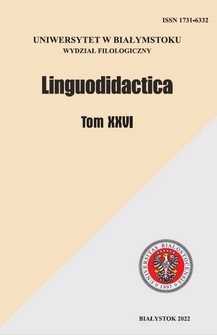ДИСТАНЦИОННОЕ ОБУЧЕНИЕ РУССКОМУ ЯЗЫКУ КАК ИНОСТРАННОМУ В УСЛОВИЯХ ПАНДЕМИИ КОРОНАВИРУСА (ПРЕИМУЩЕСТВА И НЕДОСТАТК
REMOTE TEACHING OF RUSSIAN AS A FOREIGN LANGUAGE IN CONDITIONS OF THE CORONAVIRUS PANDEMIC (ADVANTAGES AND DISADVANTAGES)
Author(s): Anna RomanikSubject(s): Foreign languages learning, Language acquisition, Eastern Slavic Languages, Higher Education , Health and medicine and law, Philology, Distance learning / e-learning
Published by: Wydawnictwo Uniwersytetu w Białymstoku
Keywords: Russian philology; Russian as a foreign language; pandemic; University of Bialystok; remote teaching;
Summary/Abstract: The object of interest of the present study is the teaching of Russian as a foreign language in remote form during the pandemic period. The author has made it the aim of the article to determine the advantages and disadvantages of distance learning Russian at a higher education institution in Poland. The analysis was based on the experience and opinions of the academic community of Russian philology at the University of Bialystok. The qualitative empirical data were obtained from an interview with subjects participating in the process of teaching and learning a foreign language – lecturers and students. The information obtained highlights a number of problems hindering remote work in language education: technical, methodological, psychological, as well as ethical troubles. Nevertheless, the experience of the respondents also shows that online learning has many advantages, such as increasing one’s own skills in operating educational platforms and programs, making classes more attractive by using the latest digital technologies and interactive teaching methods, etc.
Journal: Linguodidactica
- Issue Year: 2022
- Issue No: 26
- Page Range: 193-202
- Page Count: 10
- Language: Russian

